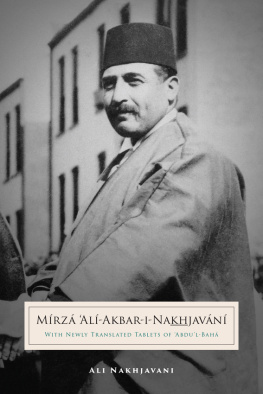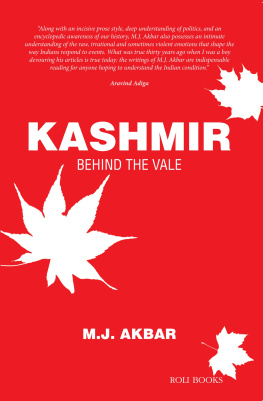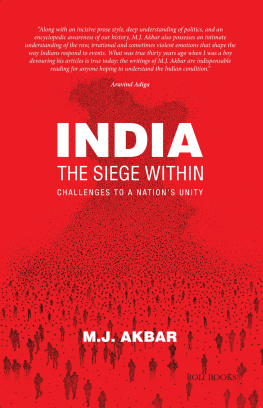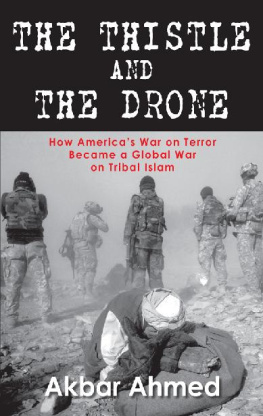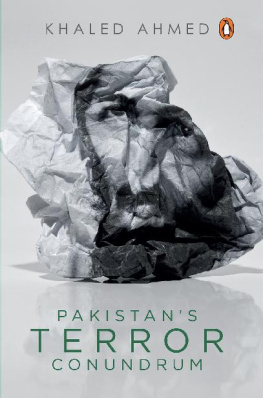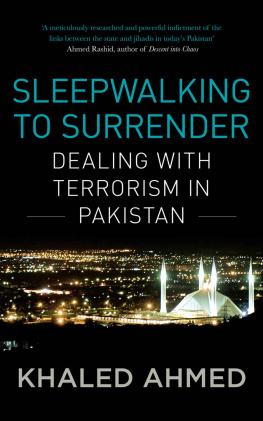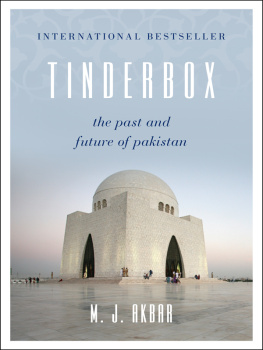
Resistance and Control in Pakistan
Revised Edition
How can people in the West make sense of contemporary unrest in the Muslim world? Is Islamic fundamentalism to be understood purely in religious terms?
In Resistance and Control in Pakistan, one of the worlds leading authorities on Islam, Akbar S. Ahmed, illuminates what is happening in the Muslim world today and assesses the underlying causes. He does this by telling the dramatic story of the revolt of the Mullah of Waziristan in north-west Pakistan and by placing it within the context of other movements occurring elsewhere in the Islamic world. From this he examines the social structure and operative principles in Muslim society and scrutinizes the influence of religion in a society that is undergoing modernization.
The author has revised Resistance and Control in Pakistan to include a fascinating new preface, in which he reconsiders this topic in the light of recent cultural and political developments.
Akbar S. Ahmed is the former High Commissioner of Pakistan to Great Britain. He is now Ibn Khaldun Chair of Islamic Studies and Professor of International Relations at the American University in Washington, DC.
Resistance and Control in Pakistan
Revised edition
Akbar S. Ahmed
First published in hardback as
Religion and Politics in Muslim Society
by Cambridge University Press
1983 Cambridge University Press
First published in paperback in 1991 by Routledge
11 New Fetter Lane, London EC4P 4EE
Simultaneously published in the USA and Canada
by Routledge
29 West 35th Street, New York, NY 10001
This revised edition first published 2004
Routledge is an imprint of the Taylor & Francis Group
This edition published in the Taylor & Francis e-Library, 2004.
To purchase your own copy of this or any of Taylor & Francis or Routledges collection of thousands of eBooks please go to www.eBookstore.tandf.co.uk.
1991, 2004 Akbar S. Ahmed
Foreword 1991, 2004 Francis Robinson
All rights reserved. No part of this book may be reprinted or reproduced or utilised in any form or by any electronic, mechanical, or other means, now known or hereafter invented, including photocopying and recording, or in any information storage or retrieval system, without permission in writing from the publishers.
British Library Cataloguing in Publication Data
A catalogue record for this book is available from the British Library
Library of Congress Cataloging in Publication Data
A catalog record for this book has been requested
ISBN 0-203-33743-3 Master e-book ISBN
ISBN 0415349109 (hbk)
0415349117 (pbk)
For Zeenat, with love
Contents
Maps and figures
Maps
Figures
Foreword
Akbar Ahmed belongs to the pages of the Boys Own paper. Both scholar and administrator, both poet and man of action, he has, since going down from Cambridge, combined a glittering career in the tribal regions of the North-West Frontier Province and Baluchistan with a no more subordinate one as an anthropologist of international repute. In recent years, he has pacified fractious tribes, advocated a forward policy, and, for the first time, carried the authority of the Pakistani state in the South Waziristan tribal agency right up to the Afghan border. He has also written half a dozen books, not to mention numerous articles, on the economy and society of the Pakistani people, as well as on their life and culture.
This book is based on Ahmeds experiences as a political agent in South Waziristan from 1978 to 1980. Stimulated not just by the growth of Muslim revivalism in the world at large but also by a Muslim movement in Waziristan, he reaches beyond his former purely Pakistani and anthropological concerns to try to discover first, what is happening in the Muslim world and, second, the underlying causes. He aims to do so by illuminating the social structure and the operative principles in contemporary Muslim society. The outcome is a significant book, not only partly because it offers an intimate analysis of the interplay between economic, social and ideological factors in human action, some of which he has experienced at first hand, but partly because it marks a notable transition in Ahmeds own concerns. Up to the first publication of this book in 1983, he focused mainly on his scholarly work, making a contribution to anthropology. Since then he has been primarily concerned, as he declared in the subtitle of a recent book, to make sense of Muslim history and society: a process which has fed a deeply felt desire to use his skills to enable Muslim and non-Muslim to understand each other better.
Ahmeds sense of mission comes at an important time for Muslim and non-Muslim alike. Rarely has it seemed more urgent that Muslims and their neighbours should understand each other better. After a period of nearly twenty years, the movement of Islamic assertiveness, which grew after the apparent slumber of the colonial period, shows no signs of abating. Indeed, it seems to be entering a new phase as now it comes to flourish, not just in the central Islamic lands, but also on the periphery: in South Asia, where the demands of the Kashmiri Muslims for self-determination have taken on an Islamic colouring; in China, where the Uigher-speaking peoples of Xinjiang have participated in an Islamic uprising against the state; and in western Europe, where Muslim immigrant communities have begun to express their grievances in Islamic terms. Moreover, as the relationship between the Russians and their subject peoples changes shape, there are signs that the Muslims among them will express their aspirations for greater autonomy in terms not just ethnic but also, on occasion, Islamic.
The prime focus of Ahmeds book is on an analysis of an Islamic movement with ethnic dimensions. Ahmed begins by setting the scene, describing Waziristan, its two great tribes, the Wazirs and the Mahsuds, their culture and their rivalry. He then places their rivalry, in which the Mahsuds have come to have the upper hand, in the context of its relationship with the developing framework of the modern state. The core of the book examines, as the region develops economically from the late 1950s, the rise to power of a mullah. Noor Muhammad, as the Mullah was known, asserted himself against established authority in the form of the tribal maliks and the political agents. As he came to command more and more resources, he built the largest and most ornate mosque in all the North-West Frontier tribal agencies with an attendant madrassah, or Islamic school, at which the sons of the maliks were taught. By the mid 1970s he led what was virtually an alternative government in the region and was both instrument and symbol of a resurgent Waziri pride. The situation ended, as it was bound to do, in tears. In pressing forward Waziri interests, the Mullah declared jihad against the Mahsuds; the government was forced to take military action against the Wazirs. The Mullah was tried and imprisoned, which did not lose him either the loyalty of any of his followers or the substantial income they brought. Examining the Mullahs motives Ahmed finds political opportunism rampant beneath a threadbare Islamic guise. Examining Waziri motives, he finds the Mullah and his Islamic rhetoric to be the vehicle through which the Wazirs could reassert their tribal position and their tribal honour against the dominant Mahsuds.




